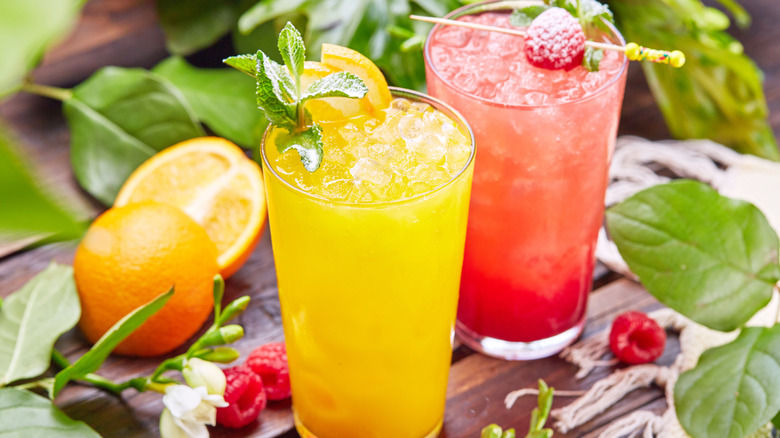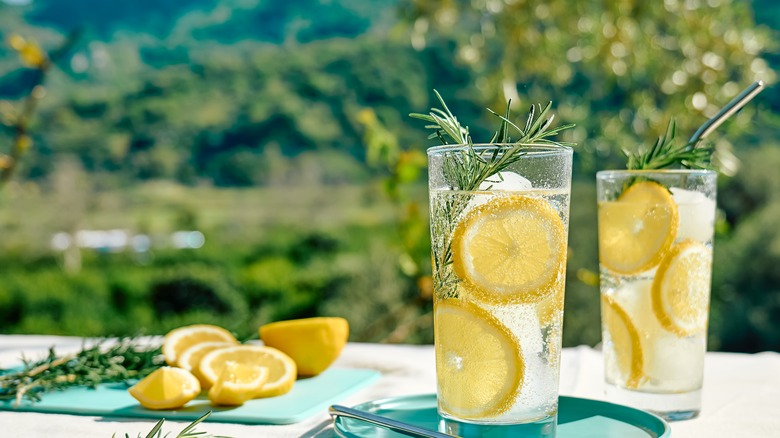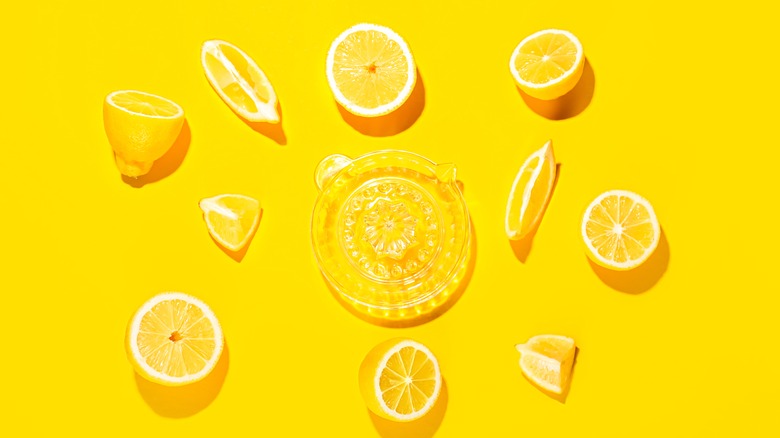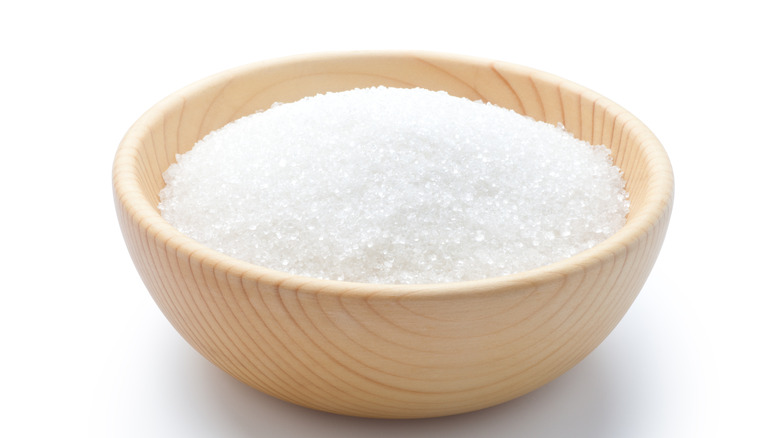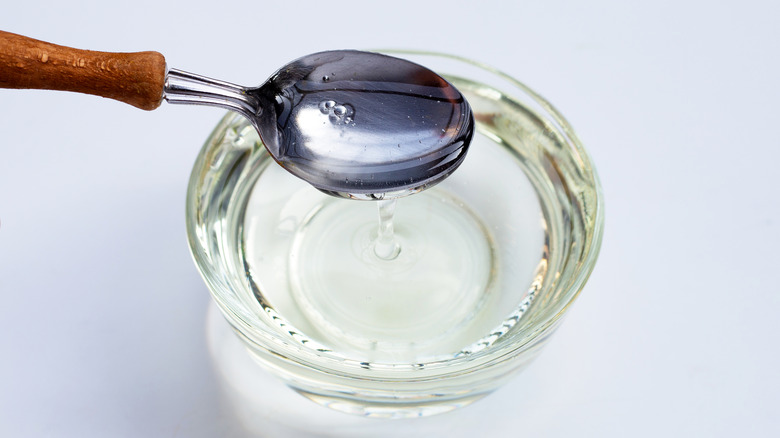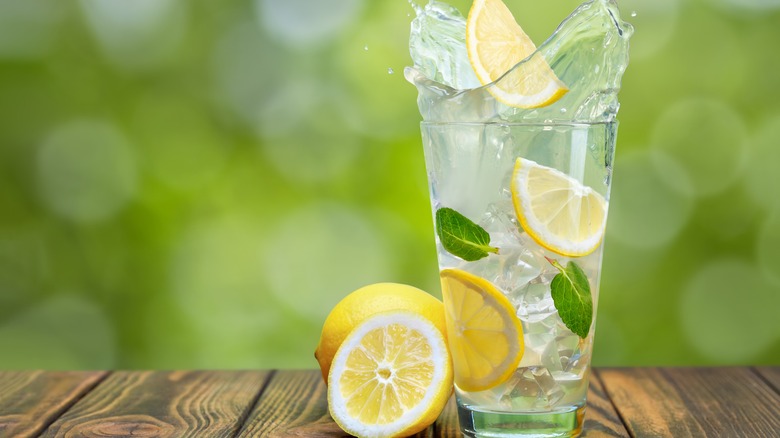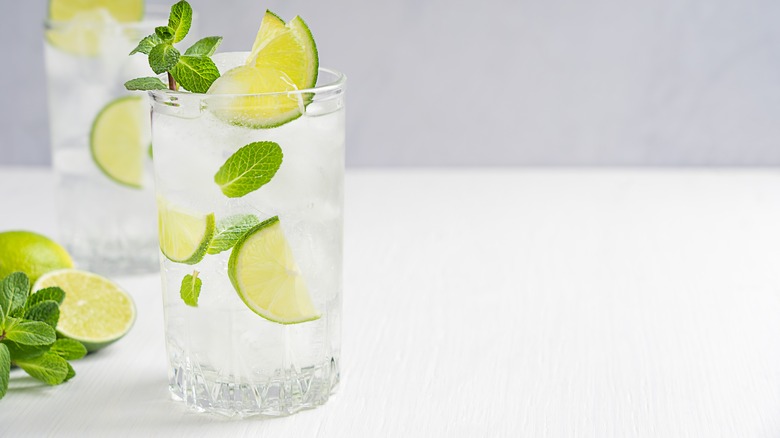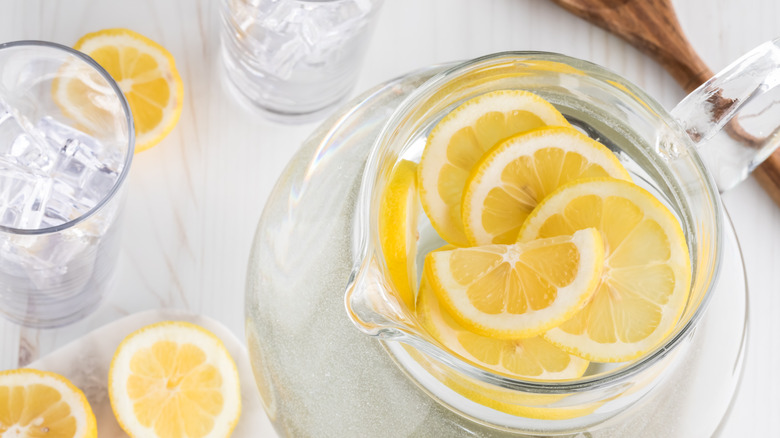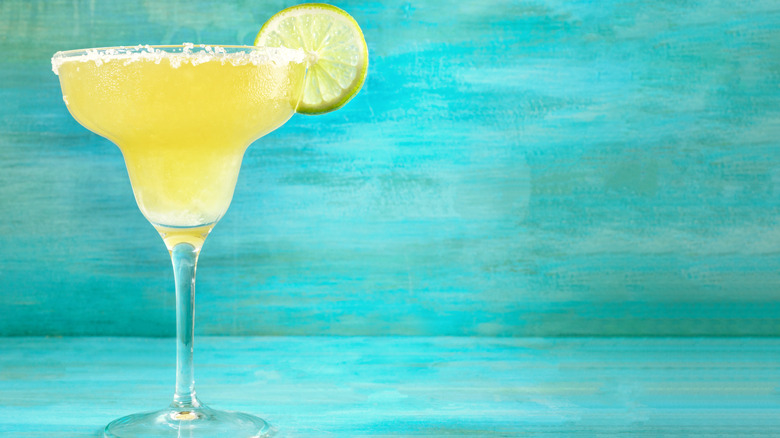9 Tips You Need For The Absolute Best Lemonade
While lemonade brings the scorching summer heat to mind, it's a refreshing drink that can be enjoyed at any time, during any season. Science has proven that lemonade (really any acidic, tart drink) satisfies thirst more than other drinks. The simple reason is that acidity stimulates the salivary glands. A dry mouth, which happens when the salivary glands take a little break, makes us thirsty (via Slate). So, next time you're craving a glass of lemonade, you know the science behind it.
Lemonade is an everyday tarty staple that many people make at home. In a pinch, you can grab some lemonade powder from the store shelves. But creating a fresh-squeezed, healthy, tangy batch yourself is simply amazing. Yes, there are healthy alternatives in the market, but nothing beats the zing that hits your tongue when you use fresh lemons.
Like every incredible thing, there is an art to it. There are methods to try, tricks to employ, and tips to help you whip up the meanest batch of lemonade. Follow these tips to turn those fresh lemons into the absolute best lemonade.
Gather up your ingredients and tools
Of course, you can't have lemonade without the must-haves. It's always super easy when you gather up everything you'd need, and they might already be in your kitchen. Now, this is where the magic begins to happen. The essential elements for lemonade are fresh lemons, sugar, and water. But don't stop there. Consider the extra piquancy you'd like to give your lemonade. Do you want it slightly more tangy or sweet? Remember to get your measuring tools. Foodics say that for liquids, measuring cups are optimum, and for dry ingredients like sugar, scales are better — especially if you are seeking to really control the sugar content.
Anyone can make lemonade with simple kitchen cookware. You just need a juicer for the lemons, a small pot to make your simple syrup, and a glass bowl or pitcher to serve and store the main drink itself.
Follow the basic recipe
Whether you watch Ina Garten's Barefoot Contessa for your recipes or you follow a simple formula handed down in your family, you'll notice that lemonade recipes are often bare. It's paramount to know your desired ratio of water to sugar, and also the appropriate quantity of lemon juice, because this sets the base for the final outcome. Before you punch up your lemonade into a lip-licking raspberry lemonade punch, you need to get a handle on the basics of freshly squeezed lemonade.
The challenge with most store-bought lemonade is that if you follow the instructions on the package, you may end up with an end product that is either too sweet or too diluted for your palate. A homemade alternative whipped up using a tested recipe may be your best bet. You can tweak or multiply it into whatever you want: mocktail, cocktail, or punch. Whenever you start from a solid base recipe, your options are endless.
Choose the right lemons
It's all about the lemons! The kind of lemons you use determines the tang, sweet-sourness and even how much juice you get. Balcony Garden Web lists a variety of different lemons, but two common types used for lemonade are the Meyer lemons and Eureka lemons, the latter being the variety you'll typically see in your grocery store's produce aisle (via Foodiecrush) The Eureka variant has been found to produce the more acidic, refreshing lemonade. The Meyer lemons, however, have it on lock in terms of getting more juice. Immaculate Bites suggests rolling them around on a chopping board to get more juice out.
In addition to the lemon's variety, you should pay attention to how the lemons you purchase look and feel. If you're aiming for a sweeter end product, buy the round fleshly lemons and avoid the ones that feel hard to touch. Those are the ones that have more pith, which tends to have a bitter taste. But if a more bitter lemonade is your jam, go for it!
Blend your sugar
It is an established scientific fact that sugar dissolves much more slowly in cold liquids than in hot liquids, explains Healing Picks, because the heat literally melts the sugar molecules and helps them fuse with the water molecules, which we call dissolution. This is why most lemonade recipes suggest that you dissolve your sugar in water over heat. However, there are afternoons when you'll crave a quick drink of lemonade and may be too impatient to follow the recipe to a T, especially if you don't have ice or cannot wait to refrigerate your concoction. That's okay. It happens to the best of us. This is why you should always blend your sugar. Blitzing or crushing your sugar will hasten the dissolution process, whether you mix it with hot or cold water.
In her Barefoot Contessa lemonade recipe, Ina Garten advises that you blend or blitz your sugar till it strikes the perfect balance between powdery and granulated. This ensures you have a fine consistency and makes for very good syrup that won't get too clumpy. So, blend the sugar and do your quick mixing if your throat needs de-parching immediately.
Use simple syrup
No refreshing drink should have a grainy consistency or sugar residues at the bottom of the glass. Most lemonade recipes involve making simple syrup, and there's a reason: it makes for a smooth sipping experience. Simple syrup is made by mixing sugar into water over heat, which helps to properly dissolve the sugar so you don't have granules floating around in your glass. Depending on the type of lemon you're using, you may or may not need a lot of simple syrup. Meyer lemons are sweet and do not require as much syrup as Eureka lemons. Take note as you make preparations.
To prepare your simple syrup, combine your sugar and water — depending on your recipe, you may use equal quantities of the two, or you can use a different ratio depending on the sweetness you're aiming for. Stir together over medium heat until the sugar dissolves completely, which should take approximately five minutes. Then leave your simple syrup to cool before mixing it with your other ingredients. It's as easy as can be.
Substitute lemonade ice cubes for regular ice cubes
Have you tried drinking your glass of lemonade after the ice you put in to keep it cold has melted? There's a massive difference in the taste as the additional water dilutes the flavor. To avoid this sad outcome, rather than using regular ice cubes to keep your pitcher or glass chilled, make lemonade ice cubes in advance. This tip is especially beneficial if you're hosting people and want to cool an entire pitcher.
You can make lemon ice cubes by cutting up some fresh lemons, using the pulp from the squeezed lemons, or by freezing part of your batch of lemonade. If you use the pulp, you'll end up with more flavorful cubes that will bring extra tang to your pitcher. You could even add some lemon zest for added zing. Just remember that whatever method you choose, you'll have to remember to prepare your ice cubes in advance with enough time for them to fully freeze through.
Add some herbs for extra flavor
Rather than stopping at classic lemonade, you could add some fresh herbs to give your drink more character both in appearance and taste. Tons of natural additives can completely transform your beverage into a super brew. Mint leaves are one of them. Add some mint to the pitcher for that extra punch and refreshing feel. Besides its refreshing taste and flavor, WebMD states that mint has numerous health benefits, such as relieving indigestion and improving brain function.
The Cookful recommends mint or basil for its sweetness. We couldn't agree more. If you're feeling more adventurous, throw in some rosemary or thyme. You could also try out this violet lemonade recipe. But if you're experimenting with one of the bolder herbs for the first time, we advise first adding it to a tester glass to ascertain how the flavor sits on your taste buds. After all, nobody wants to be stuck with an entire pitcher of lemonade with a taste they don't enjoy.
Throw in extra slices of lemon and other fruits
Throw a tropical-flavored party for your taste buds by adding some freshly cut fruit to your lemonade. Slices of lemon or other citrus fruits like orange and lime can provide that extra citrus zing — though as a warning, this can raise your beverage's acidity, which has some dental drawbacks, as Laulani Dental Care notes. Sweet fruits like strawberries or blueberries (any berries, really) combine with the lemon in a super excellent way to balance out the beverage's sourness. If you've made a version of pink lemonade, any red fruit like strawberries or cranberries will help to amplify that signature color. And don't forget other possible fruit additions like watermelon, cantaloupe, peaches, or even cucumbers. You can even take it a notch higher by using frozen fruits. They help chill your drink and still lend their unique tastes to the batch.
Add a bit of alcohol to make a cocktail
Lemonade hits differently with some spirit jammed in. Whether you're adding just a smidge of alcohol to make a mild punch or pouring more heavily for a boozy concoction, there are a wide variety of ways you can jazz up your lemonade to make a banging cocktail. For a minimalist approach, you can separate the batches of your lemonade and add some vodka, tequila, or even rum with some salt to make a margarita. Or perhaps you would prefer the slap of this raspberry lemonade punch instead. There are a ton of options when it comes to spiking your lemonade.
Whatever you choose, it's essential to label your pitchers appropriately so that those who want to avoid alcohol can do so easily — especially if you're serving both adults and children. You might also want to take it easy on the cocktails, as they're packed with more calories than you'd get just drinking plain lemonade.
